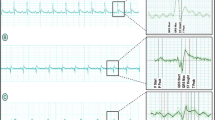Summary
The effects of L-carnitine, as an ingredient of cardioplegia solution, on cardiac function and cardiomyocyte apoptosis in patients undergoing heart valve replacement operation were investigated. Twenty-three cases undergoing heart valve replacement with cardiopulmonary bypass (CPB) were randomly allocated into two groups: L-carnitine group (n=12, 12 g/L L-carnitine was put in the ST. Thomas cardioplegia) and control group (n=11, identical to the L-carnitine group except that normal saline was administered instead of L-carnitine). Serum cardial troponin I (cTnI) levels, the left ventricular ejection fraction (LVEF), and cardiac index (CI) were measured perioperatively. A bit of myocardial tissue obtained from right atria was taken before CPB and by the end of intracardiac procedure to undergo electron microscopy examination and estimate apoptosis by terminal deoxynucleotidyl transferase-mediated dUTP nick end-labeling (TUNEL). From the end of CPB to 3 days after operation, the serum levels of cTnI in the L-carnitine group was significantly lower than that in the control group (P<0.05). Heart color ultrasonogram showed that the CI index and LVEF at 7th day postoperatively in the L-carnitine group were significantly higher than in the control group (P<0.05). Compared to the control group, L-carnitine significantly alleviated the morphologic changes of cardiac muscle cells (electron microscopy examination) and decreased the amounts of apoptotic cardiac muscle cells (TUNEL). Furthermore, the dosage of vasoactive drugs used after operation was significantly less in the L-carnitine group (P<0.01). It was concluded that L-carnitine cardioplegia solution could improve cardiac function in patients undergoing heart valve replacement operation and alleviate CPB-mediated apoptosis of cardiac muscle cells.
Similar content being viewed by others
References
Nemoto S, Yasuhara K, Nakamura Ket al. Plasma carnitine concentrations in patients undergoing open heart surgery. Ann Thorac Cardiovasc Surg, 2004,10: 19
Zaugg C E, Spaniol M, Kaufmann Pet al. Myocardial function and energy metabolism in carnitine-deficient rats. Cell Mol Life Sci, 2003,60:767
Pastoris O, Dossena M, Foppa P,et al. Effect of L-carnitine on myocardial metabolism: results of a balanced, placebo-controlled, double-blind study in patients undergoing open heart surgery. Pharmacol Res, 1998,37(2):115
Cavrieli Y, Sherman Y, Ben-Sasson S A. Identification of programmed cell death in situ via specific labeling of nuclear DNA fragmentation. J Cell Biol, 1992,119:493
Stadler B, Phillips J, Toyoda Yet al. Adenosine enhanced ischemic preconditioning modulates necrosis and apoptosis: effects of stunning and ischemia reperfusion. Ann Thorac Surg, 2001,72:555
Lopez J R, Jahangir R, Jahangir Aet al. Potassium channel openers prevent potassium-induced calcium loading of cardiac cells: possible implications in cardioplegia. J Thorac Cardiovasc Surg, 1996,112,820
Carvajal K, Moreno-Sanchez R. Heart metabolic disturbances in cardiovascular diseases. Arch Med Res, 2003,34:89
Evangeliou A, Vlassopoulos D. Carnitine metabolism and deficit—when supplementation is necessary? Curr Pharm Biotechnol, 2003,4:211
Buerke M, Murohara T, Skurk Cet al. Cardioprotective effect of insulin-like growth factor I in myocardial ischemia followed by reperfusion. Proc Natl Acad Sci U S A, 1995, 15(92):8031
Gottlieb R A, Burleson K O, Kloner R Aet al. Reperfusion injury induces apoptosis in rabbit cardiomyocytes. J Clin Invest, 1994,94:1621
Yeh C H, Wang Y C, Wu Y Cet al. Continuous tepid blood cardioplegia can preserve coronary endothelium and ameliorate the occurrence of cardiomyocyte apoptosis. Chest, 2003,123:1647
Fringuelli R, Utrilla Navarro M P, Milanese Let al. Synthesis and evaluation of anti-apoptotic activity of L-carnitine cyclic analogues and amino acid derivatives. Farmaco, 2004,59:271
Author information
Authors and Affiliations
Corresponding author
Additional information
XIANG Daokang, male, born in 1968, Associate Professor
This project was supported by a grant from Guizhou Provincial Natural Sciences Foundation (No. 2003-C03-1).
Rights and permissions
About this article
Cite this article
Daokang, X., Zongquan, S., Jiahong, X. et al. Effect of L-carnitine on cardiomyocyte apoptosis and cardiac function in patients undergoing heart valve replacement operation. J. Huazhong Univ. Sci. Technol. [Med. Sci.] 25, 501–504 (2005). https://doi.org/10.1007/BF02895999
Received:
Issue Date:
DOI: https://doi.org/10.1007/BF02895999




